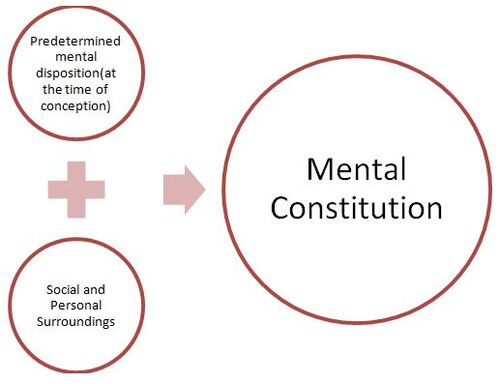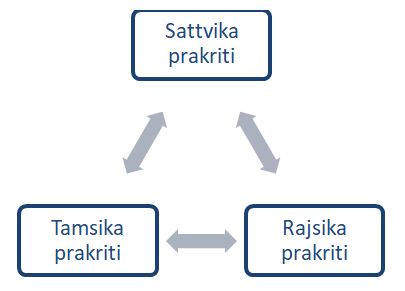Manas prakriti
The psychological constitution of an individual is known as ‘manasika prakriti’. In terms of thoughts, motivation, response, intellect, logic, and emotion, it is the sum total of features and patterns that influence the personal and social conduct of the individual. In Ayurveda, the role of mental constitution in the treatment of ailments is widely recognized. Ayurveda explains mental dosha, psychological constitutions and classification of mental disorders distinctly. This is helpful in determining predisposition and vulnerability to stressors and their consequences. This drives the person to think, feel, and act in certain ways; and makes each person unique.
| Section/Chapter/topic | Concepts/Prakriti/Manas prakriti |
|---|---|
| Authors | Bojani M. K. 1, Tanwar A. K. 2 |
| Reviewers | Basisht G.3, |
| Editors | Deole Y.S.3 Basisht G.3 |
| Affiliations |
1 Department of Sharir Kriya, All India Institute of Ayurveda, New Delhi 2 Department of Kriya Sharira, All India Institute of Ayurveda, New Delhi 3 Charak Samhita Research, Training and Development Centre, I.T.R.A., Jamnagar,India |
| Correspondence emails | carakasamhita@gmail.com |
| Date of first publication: | January 20, 2022 |
| DOI | under process |
Etymological derivation
The word ‘manasa prakriti’ is made from two different words, manasa and prakriti. Manasa denotes mind or psyche. Prakriti denotes nature or form or source. Thus, the word ‘Manasa prakriti’ means "natural or original form" or "original source" of individual’s psychological qualities. It forms the psychological constitution.
Synonyms
The psychological constitution is also known as mental disposition, mental temperament, mental constitution, personality, mental trait and psychological rhythm. Manasika prakriti denotes mind's design, psychological makeup of an individual,[1] totality of an individual's reactions and interactions with others, influencing factors behind personal morals, perceptions, values, and attitudes.
Formation and development
Prakriti is formed during conception by union of sperm (shukra) and ovum (shonita) with consciousness elements (atmavikara).[Su.Sa. Sharira Sthana 4/63][2] Manasa prakriti is formed at the same moment by combination of three primary attributes (trigunatmaka)(Code: SAT-A.126).[3]This forms the fundamental structure of psychological constitution. The hereditary components, social surroundings, personal factors like diet, experiences, and cultural background determine the development of psychological constitution further.
Changeable nature
The qualities (guna) are constantly influenced by above mentioned factors. Thus, the psychological constitution may change relatively to the influence of surrounding factors and experiences. It may shift from tamas dominance to rajas dominance or sattva dominance and vice versa. There is always a predominance of activity of one attribute over another. This dominance influences and determines the individual's personality. A person's mind appears different in different situations owing to differences in perception and connections with purity (sattva), passion (rajas), and ignorance (tamas)(Code: SAT-A.127-129)[3][Chakrapani on Cha.Sa.Sharira Sthana 3/13][Chakrapani on Cha.Sa.Sutra Sthana 8/5]. The mental disposition is ultimately determined by the frequency of predominance.[Cha.Sa.Sutra Sthana 8/6]
Mental personality is the result of an individual's continuous and inherent development in terms of how they adopt with the situation. A variety of mental characteristics are observed in the behavior pattern that are influenced by the social environment.
Classification
Ayurvedic mental constitution is categorized on the basis of three fundamental attributes (triguna). Accordingly, there are three types viz. shuddha (sattva dominant), rajas dominant, and tamas dominant having respective determining factors (bhaga or ansha). [Cha.Sa.[[Sharira Sthana 4/36] The three factors are welfare tendency or auspiciousness (kalyanansha), anger or passion tendency (roshansha), and perplexity or bewilderment (mohansha). This makes the constitution dynamic. The following table shows the characteristics of these three personalities. [Su.Sa.Sharira Sthana 1/98][2]
| S.No. | Type of Mental constitution | Qualities |
|---|---|---|
| 1 | Sattvika(Code: VE-1)[3] | Kindness (anrushasyam) |
| Tendency of sharing belongings (samvibhagaruchita) | ||
| Forgiveness (titiksha) | ||
| Truthfulness (satya) | ||
| Religiousness (dharma) | ||
| Believing in God or veda (astikyam) or optimism | ||
| Knowledgeable (gyana) | ||
| Logical intelligence (buddhi) | ||
| Good memory(smriti) | ||
| Wisdom (medha) | ||
| Good retention power of the mind (dhriti) | ||
| Non attachment or overindulgence (anabhishanga) | ||
| 2 | Rajasika (Code: VE-2)[3] | Excessive miseries in life (dukkha) |
| Excessive wandering (atanshilata) | ||
| Less retention or impatience (adhriti) | ||
| Ego (ahankar) | ||
| Untruthfulness (anrutikatvam) | ||
| Unkindness (akarunyam) | ||
| Hypocrisy or fraud (dambha) | ||
| Haughtiness or arrogance (mana) | ||
| Pleasure or exhilaration (harsh) | ||
| Lust or excessive indulgence (kama) | ||
| Anger (krodha) | ||
| 3 | Tamasika (Code: VE-3)[3] | Sadness (vishada) |
| Not believing in God and veda (nastikyam) or pessimism | ||
| Not follow the religion or righteousness (adharmashilata) | ||
| Perverted intelligence (buddhenirodho) | ||
| Dumbness (ajnana) | ||
| Foolishness (durmedhastvam) | ||
| Lethargy or inactivity (akarmashilta) | ||
| Sleepiness (nidralu) |
- ↑ Available on https://dictionary.apa.org/constitution.
- ↑ 2.0 2.1 Sushruta. Sushruta Samhita. Edited by Jadavaji Trikamji Aacharya. 8th ed. Varanasi: Chaukhambha Orientalia;2005.
- ↑ 3.0 3.1 3.2 3.3 3.4 National AYUSH Morbidity and Standardized Terminologies Electronic Portal by Ministry of AYUSH Available on http://namstp.ayush.gov.in/#/Ayurveda

